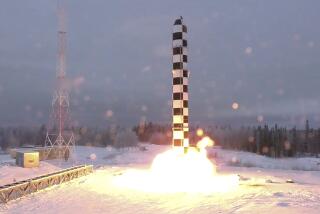Clinton May OK Resuming Underground Nuclear Tests
- Share via
WASHINGTON — The Clinton Administration is moving toward a decision to allow limited underground tests of nuclear weapons when a moratorium ends later this year. However, the President is expected to reaffirm a ban on further tests after 1996, officials said Saturday.
The probable decision, which one official described as “still weeks away,” would reconfirm the Administration’s existing policy on nuclear testing and reject several proposals for change.
But even a decision to allow testing to resume would probably not lead to an immediate resumption of tests, officials noted.
President Clinton’s top national security advisers met Friday and discussed the issue but came to no resolution, they said.
Clinton has endorsed the idea of a multinational treaty to ban nuclear testing, in part because it would help in efforts to stop the spread of nuclear weapons to countries that do not yet possess them.
But he has called for a phased approach to a test ban, not an immediate end to testing.
Some liberal Democrats have demanded a complete end to tests. On the other side, Defense Department nuclear strategists want to resume the underground explosions, both to test the reliability of existing weapons and to find ways to improve them.
The current policy is based on a law Congress passed last year that imposed a moratorium on tests until July 1, allowed up to 15 underground tests after that date solely for the purpose of ensuring the weapons’ safety, and required the Administration to negotiate a compromise test ban treaty by 1996.
Officials at the Pentagon and the Energy Department have argued that the Administration should seek a test ban treaty that would allow testing small nuclear devices. But influential members of Congress told Clinton this month that they would strongly oppose that approach.
Allowing those tests to continue “would send precisely the wrong signal to both nuclear and non-nuclear nations,” Senate Majority Leader George J. Mitchell (D-Me.) and other senators argued in a letter to the White House.
More to Read
Sign up for Essential California
The most important California stories and recommendations in your inbox every morning.
You may occasionally receive promotional content from the Los Angeles Times.














